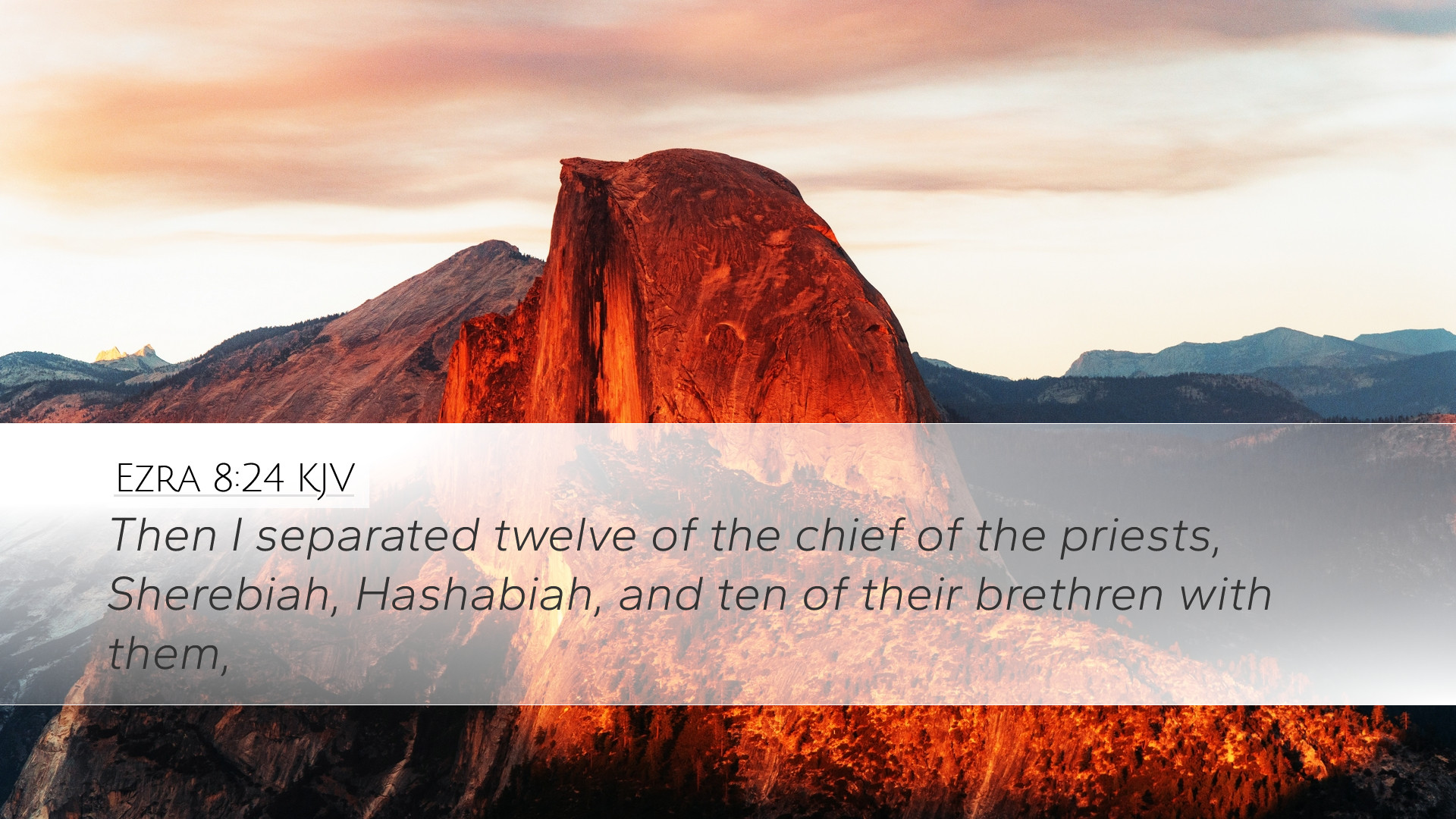Commentary on Ezra 8:24
In Ezra 8:24, we witness the profound leadership and divine guidance exercised by Ezra during the return of the exiles from Babylon to Jerusalem. This verse states:
"Then I set apart twelve of the leaders of the priests, Sherebiah, Hashabiah, and ten of their brethren with them."
Context and Overview
The book of Ezra documents the return of the Jewish exiles to Jerusalem and the rebuilding of the temple. This particular passage occurs during a crucial moment as Ezra prepares for the journey, emphasizing the importance of spiritual leadership and accountability among the returning exiles.
Leadership in Spiritual Matters
Matthew Henry notes that Ezra’s decision to appoint leaders was intentional. By selecting twelve priests, he mirrored the twelve tribes of Israel, establishing a sense of communal responsibility and divine order. Priests held significant roles as mediators between God and the people, highlighting the necessity for spiritual oversight during the perilous journey back to Jerusalem.
Priestly Representation
Each leader represents a particular aspect of priestly duties, ensuring that the worship and rituals would be maintained throughout the journey. Adam Clarke elaborates on the importance of these leaders, indicating that their roles were to oversee the people, maintain order, and offer sacrifices, thus ensuring that the journey was not only physical but also spiritual.
Spiritual Preparedness and Accountability
Ezra’s act of appointing leaders reflects a commitment to spiritual preparedness. Albert Barnes highlights that this act ensured accountability among the returning exiles. The presence of leaders meant that there was a structured approach to governance and worship, which was crucial for the preservation of their faith amidst the challenges they would face.
The Importance of Accountability
The emphasis on leadership and accountability is a critical lesson for pastors and church leaders today. This concept is echoed in modern church practices, wherein spiritual oversight is essential for maintaining doctrinal purity and collective integrity within congregations.
Divine Purpose in Leadership
The selection of priests also indicates God’s providence at work through human agency. As Matthew Henry points out, the leaders were not just chosen for their authority but were called to fulfill divine purposes. Their responsibilities were to be carried out with reverence and dedication, bringing the people closer to God.
The Role of Divine Guidance
Ezra’s actions serve as an example of reliance on divine guidance in leadership. Clarke notes that it is imperative for leaders to seek God’s wisdom in their decisions, ensuring that their actions align with His will. This dependence on divine guidance is vital for effective ministry and leadership within the church, as it fosters a culture of prayer and discernment.
Challenges and Resilience
As the exiles prepared for their journey, they faced numerous challenges — from potential bandit attacks to the fear of re-establishing their community in Jerusalem. Ezra’s decision to appoint specific leaders illustrates proactive measures against such uncertainties. Barnes comments that having dependable leaders during the journey provided reassurance to the people.
Building a Support System
The selection of leaders also establishes a support system. During moments of difficulty, having trusted spiritual leaders can provide guidance and encouragement. This principle of establishing support within a community is central to the Church today, urging congregations to cultivate strong leadership structures that foster resilience against trials.
Conclusion
In conclusion, Ezra 8:24 serves as a rich source of insight regarding the dynamics of spiritual leadership, accountability, and divine guidance. The act of selecting leaders among the priests is not only a historical detail but a significant lesson for contemporary pastors, students, and theologians:
- Spiritual leadership is imperative: It establishes order and accountability within the community.
- Divine guidance is essential: Leaders must seek God's wisdom in their endeavors.
- Building resilience: Strong leadership structures provide necessary support during challenges.
- Community representation: Leaders symbolize the entire faith community and help maintain spiritual integrity.
In our modern context, these principles remain pivotal for the effective functioning of the Church, encouraging leaders to emulate Ezra’s dedication to God and His people.


